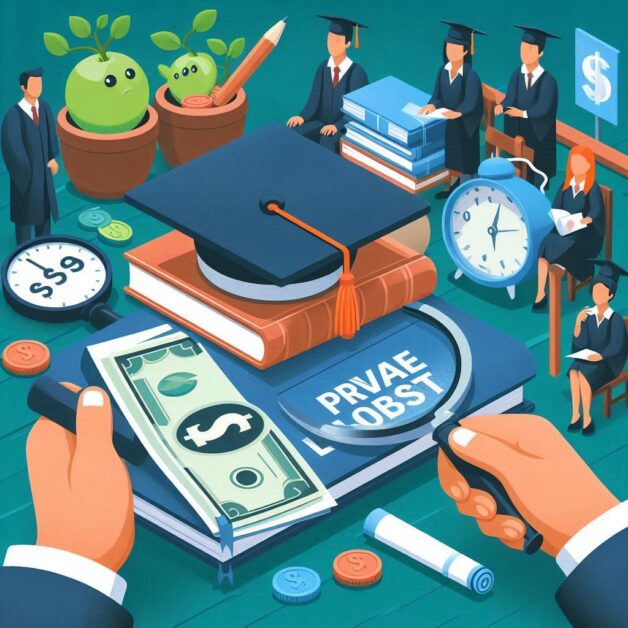Private student loans are a way for students to borrow money for their education when they max out their federal loan options or need additional funds. Unlike federal loans, private student loans come from banks, credit unions, or other private lenders. This means the terms and interest rates can vary widely, depending on the lender and the borrower’s creditworthiness.
A key reason some students take out private student loans is the ability to borrow larger sums of money. Federal loans have borrowing limits, which might not cover the total cost of attendance for expensive schools or extended programs. By turning to private lenders, students can bridge this financial gap.
However, private student loans come with their own set of trade-offs. Interest rates on private loans might be higher, and they can be fixed or variable. A variable rate might start low, but it can increase over time, making payments more unpredictable. In contrast, federal loans typically have fixed rates, which can make budgeting easier.
Another point to consider is repayment flexibility. Federal loans offer various income-driven repayment plans and forgiveness programs, which can be very helpful if your post-graduation income isn’t as high as expected. Private lenders might offer fewer options, making it essential to read the fine print before you commit.
Choosing a private student loan requires careful comparison of different lenders. Pay attention to the interest rates, fees, and terms of repayment. It’s also worth checking if the lender offers any benefits such as a co-signer release option, which can be helpful if someone else is helping you qualify for the loan.
In summary, private student loans can be a valuable resource when other financial aid doesn’t cover all your educational expenses. But like any significant financial decision, they come with risks and benefits that must be weighed carefully. Understanding these details can help you make an informed choice that aligns with your long-term financial goals.
Here’s a little transparency: Our website contains affiliate links. This means if you click and make a purchase, we may receive a small commission. Don’t worry, there’s no extra cost to you. It’s a simple way you can support our mission to bring you quality content.”
Contents
Repayment Terms and Conditions
Private student loans have their own set of terms and conditions that you’ll need to understand before borrowing. One of the first things to note is when you actually need to start repaying your loans after graduation. Typically, private lenders provide a grace period, which is a span of time after you graduate before you have to begin making payments. This grace period usually lasts six months but can vary depending on the lender.

During this grace period, interest might still accrue on your loan, adding to the total amount you owe. It’s crucial to clarify this detail with your lender to avoid any surprises. Some loans might offer deferment options if you continue your education or face financial hardship, but these terms aren’t as flexible as federal loans.
Most private student loans come with fixed repayment periods, usually ranging from five to fifteen years. The shorter your repayment term, the higher your monthly payments will be, but you’ll pay less in interest over the life of the loan. Longer repayment periods can make monthly payments more manageable, but you’ll end up paying more in interest.
Interest rates on private student loans can be either fixed or variable. A fixed rate won’t change over the life of the loan, providing stability in your monthly payments. Variable rates can change based on market conditions, which may initially be lower than fixed rates but can increase significantly over time, potentially raising your monthly payments.
Understanding the terms and repayment conditions of your private student loan is essential for financial planning. Know when your grace period ends, how interest accrues, and what your repayment options are. This knowledge will help you manage your loans more effectively and avoid financial pitfalls.
How Long After Graduation Do You Have to Start Repaying Your Student Loans?
Private student loans generally offer a grace period before you need to start repayment. This period often lasts six months but can vary based on the lender. Knowing the exact duration helps you plan your finances effectively right after graduation.
Grace periods are essential as they give new graduates time to find a job and adjust to post-college life before loan payments kick in. This buffer can ease the financial transition and make the early months after college less stressful.
It’s important to understand that interest might accrue during this grace period, meaning the total amount you owe could increase before you even start making payments. Some lenders offer options to make interest-only payments during the grace period, which can help reduce the overall cost of the loan.
Different lenders have different policies regarding grace periods, so check your loan documents or contact your lender directly to get the specifics. Some might even offer extensions or additional deferment options if you pursue further education or face temporary financial hardships.
If you’re unable to start repaying your loans immediately after the grace period ends, you should contact your lender to discuss your options. Some lenders might offer temporary forbearance or other solutions to help you manage your payments until you’re on your feet financially.
Planning ahead for loan repayment can save you a lot of stress and money in the long run. Set up reminders for important dates, such as when your grace period ends, and consider creating a budget to prepare for the upcoming payments. The more proactive you are, the smoother your repayment journey will be.
Repayment Grace Periods
Most private student loans include a grace period after graduation, typically lasting six months. This gives graduates time to secure a job and stabilize their finances before loan payments begin. However, it’s important to check the specifics with your lender, as grace periods can vary.
Things to Know About Grace Periods:
- Interest Accrual: Most loans continue to accrue interest during this time. Paying off the interest early can save money in the long run.
- Flexibility Options: Some lenders allow interest-only payments during the grace period to help reduce the overall balance.
Repayment Options and Terms
Private student loans generally have fixed repayment terms ranging from 5 to 15 years. Shorter terms mean higher monthly payments but lower overall interest costs, while longer terms make payments more manageable at the expense of paying more in interest over time.
Fixed vs. Variable Interest Rates
- Fixed Rates: Offer predictable monthly payments, making budgeting easier.
- Variable Rates: Start lower but may increase over time, depending on market conditions.
Tips for Managing Repayments
1. Create a Repayment Budget
- List your income and expenses to determine how much you can allocate toward loan payments.
- Look for areas where you can cut back to free up funds.
2. Consider Refinancing or Consolidating
- Refinancing: Replaces your current loan with one at a lower interest rate, potentially reducing monthly payments.
- Consolidation: Combines multiple loans into a single loan for easier management.
3. Explore Income-Driven Plans
Some private lenders offer income-driven repayment plans that adjust payments based on your earnings. While less common than with federal loans, it’s worth checking with your lender.
4. Take Advantage of Co-Signer Release
If you have a co-signer, some lenders allow you to release them after a set number of on-time payments, improving their financial freedom.
5. Stay in Communication with Your Lender
If you anticipate difficulty making payments, contact your lender early. They may offer forbearance or adjusted repayment options to help.
Avoiding Common Pitfalls
1. Ignoring Interest During Grace Periods
Interest accrual can significantly increase your balance. Paying off even a portion of the interest can help.
2. Missing Payments
Missed payments can hurt your credit score and lead to penalties. Set up reminders or enroll in autopay to stay on track.
3. Overlooking Fine Print
Understand your loan terms thoroughly before signing to avoid surprises down the road.
Final Thoughts
Private student loans can help bridge financial gaps in your education, but managing them effectively after graduation is crucial. By understanding your repayment options, leveraging strategies like refinancing, and maintaining open communication with your lender, you can tackle your loans and work toward financial freedom.
“Take control of your student loan repayment journey! Download our comprehensive guides to learn everything you need about managing private and federal student loans, budgeting for success, and exploring repayment options.
Equip yourself with the knowledge to tackle your loans with confidence. Click to access your free resources now!”
Need help planning your repayment strategy? Check out our Debt Repayment Planner Tool for personalized insights and tips to stay ahead of your loans!
Strategies for Managing Private Student Loan Repayment
One of the best strategies for managing private student loan repayment is to explore income-driven repayment plans if your lender offers them. These plans adjust your monthly payment based on your income, making it easier to manage your budget while staying on top of your loan payments.
Another viable option is refinancing or consolidating your loans. Refinancing involves taking out a new loan with a lower interest rate to pay off your existing loans. This can reduce both your monthly payments and the total amount you’ll pay over the life of the loan. Loan consolidation combines multiple loans into one, simplifying your repayment process and potentially lowering your monthly payment. However, it’s crucial to read the terms carefully to ensure it’s beneficial for your situation.
Creating a budget is another key step in managing your loan repayment. Start by listing all your monthly income and expenses, including your loan payments. This will give you a clear picture of your financial situation and help identify areas where you can cut back to allocate more funds towards your loans.
Utilizing financial counseling services can provide personalized advice tailored to your specific circumstances. Many colleges offer these services to their alumni, and there are also nonprofit organizations that specialize in student loan counseling. These experts can help you develop a repayment strategy that fits your financial goals.
Lastly, be open to communication with your lender. If you’re having trouble making payments, it’s better to reach out early rather than miss a payment. Lenders might offer solutions such as adjusting your payment plan or providing temporary forbearance to ease your financial burden. Consistent dialogue with your lender can prevent issues from compounding over time.


This article provides a detailed look at private student loans, focusing on repayment options that begin after graduation. It outlines the differences between immediate repayment and deferred plans, offering insights into how students can manage their finances more effectively once they finish their studies. The emphasis on understanding interest accrual and the impact on overall loan costs is particularly useful for making informed choices. It’s a great resource for students considering private loans and looking to plan for their financial future.
Thanks for your thoughtful comment, Marc! You’ve pointed out some important points about handling private student loans wisely. It’s super important for students to grasp not just their repayment choices but also how interest can pile up over time on their loans.
Quick Tip: If you’re looking at private student loans, make sure to check out the terms from different lenders, like interest rates and repayment options. This can help you choose the best fit for your finances and might save you some cash down the road.